Analysis of Management and Operation at Unilever - Report
VerifiedAdded on 2020/11/23
|17
|5420
|108
Report
AI Summary
This report offers a comprehensive analysis of management and operation at Unilever, a UK-based multinational consumer goods company. It explores the distinct roles and characteristics of leaders and managers, contrasting their approaches to vision creation, risk management, and team motivation. The report examines how these roles apply in various situational contexts, including conflict resolution, sales reduction, and employee turnover. It delves into leadership theories like situational and contingency theories, illustrating their application within Unilever. Furthermore, the report assesses the importance of operation management in achieving business objectives and identifies factors impacting operational decision-making. The analysis covers key aspects such as leadership styles, conflict management strategies, and the impact of managerial decisions on Unilever's overall performance, providing a valuable resource for understanding effective management practices.
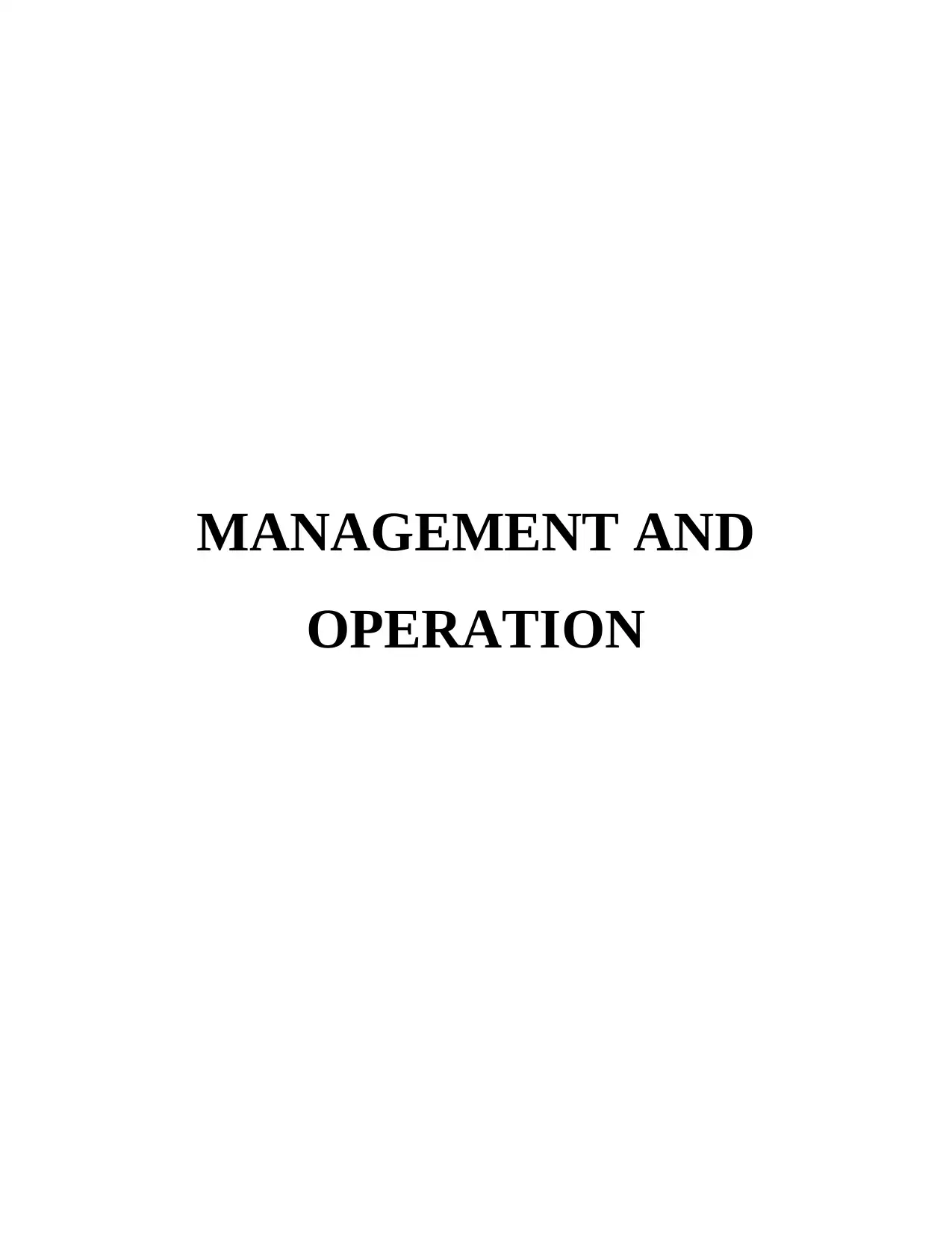
MANAGEMENT AND
OPERATION
OPERATION
Paraphrase This Document
Need a fresh take? Get an instant paraphrase of this document with our AI Paraphraser
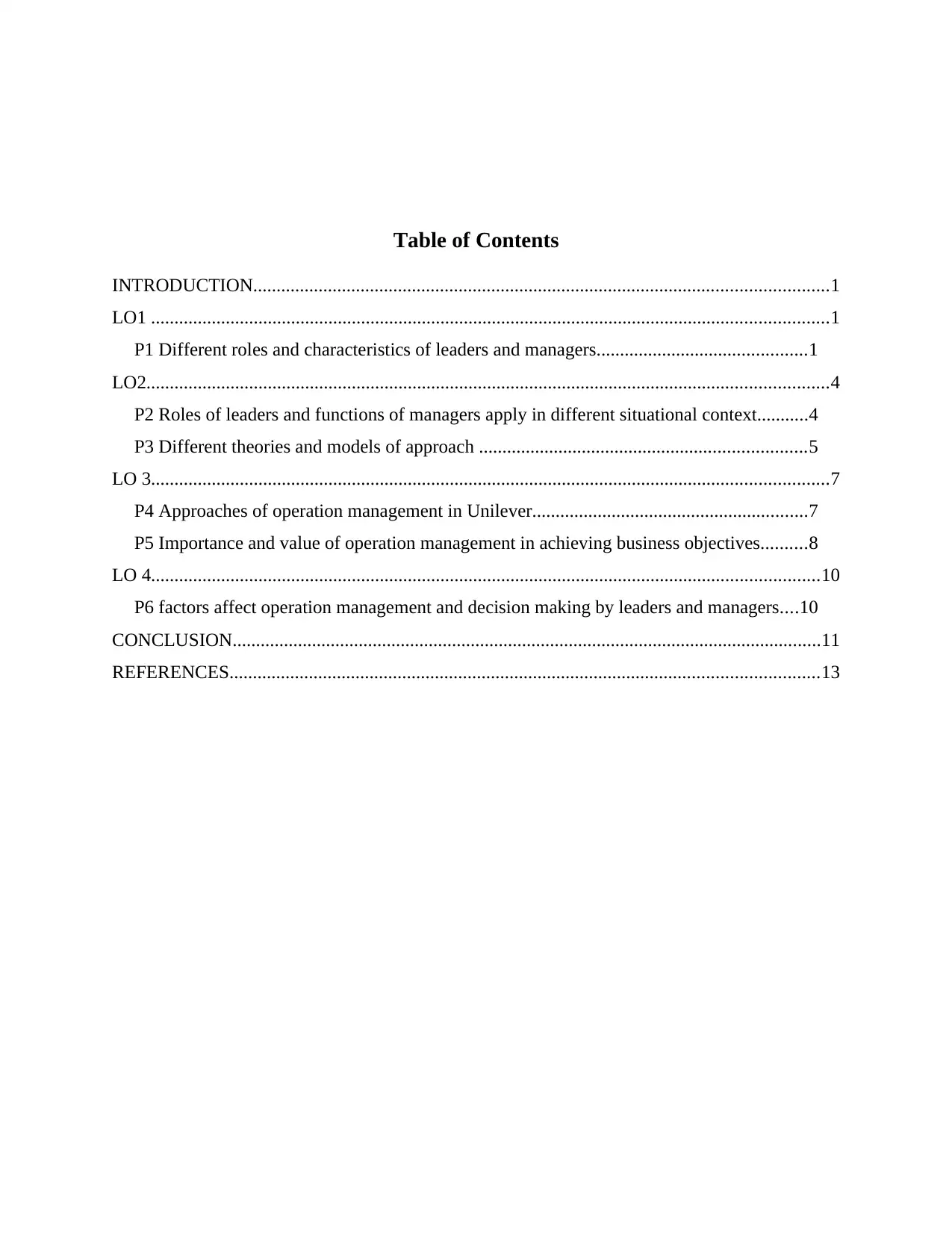
Table of Contents
INTRODUCTION...........................................................................................................................1
LO1 .................................................................................................................................................1
P1 Different roles and characteristics of leaders and managers.............................................1
LO2..................................................................................................................................................4
P2 Roles of leaders and functions of managers apply in different situational context...........4
P3 Different theories and models of approach ......................................................................5
LO 3.................................................................................................................................................7
P4 Approaches of operation management in Unilever...........................................................7
P5 Importance and value of operation management in achieving business objectives..........8
LO 4...............................................................................................................................................10
P6 factors affect operation management and decision making by leaders and managers....10
CONCLUSION..............................................................................................................................11
REFERENCES..............................................................................................................................13
INTRODUCTION...........................................................................................................................1
LO1 .................................................................................................................................................1
P1 Different roles and characteristics of leaders and managers.............................................1
LO2..................................................................................................................................................4
P2 Roles of leaders and functions of managers apply in different situational context...........4
P3 Different theories and models of approach ......................................................................5
LO 3.................................................................................................................................................7
P4 Approaches of operation management in Unilever...........................................................7
P5 Importance and value of operation management in achieving business objectives..........8
LO 4...............................................................................................................................................10
P6 factors affect operation management and decision making by leaders and managers....10
CONCLUSION..............................................................................................................................11
REFERENCES..............................................................................................................................13
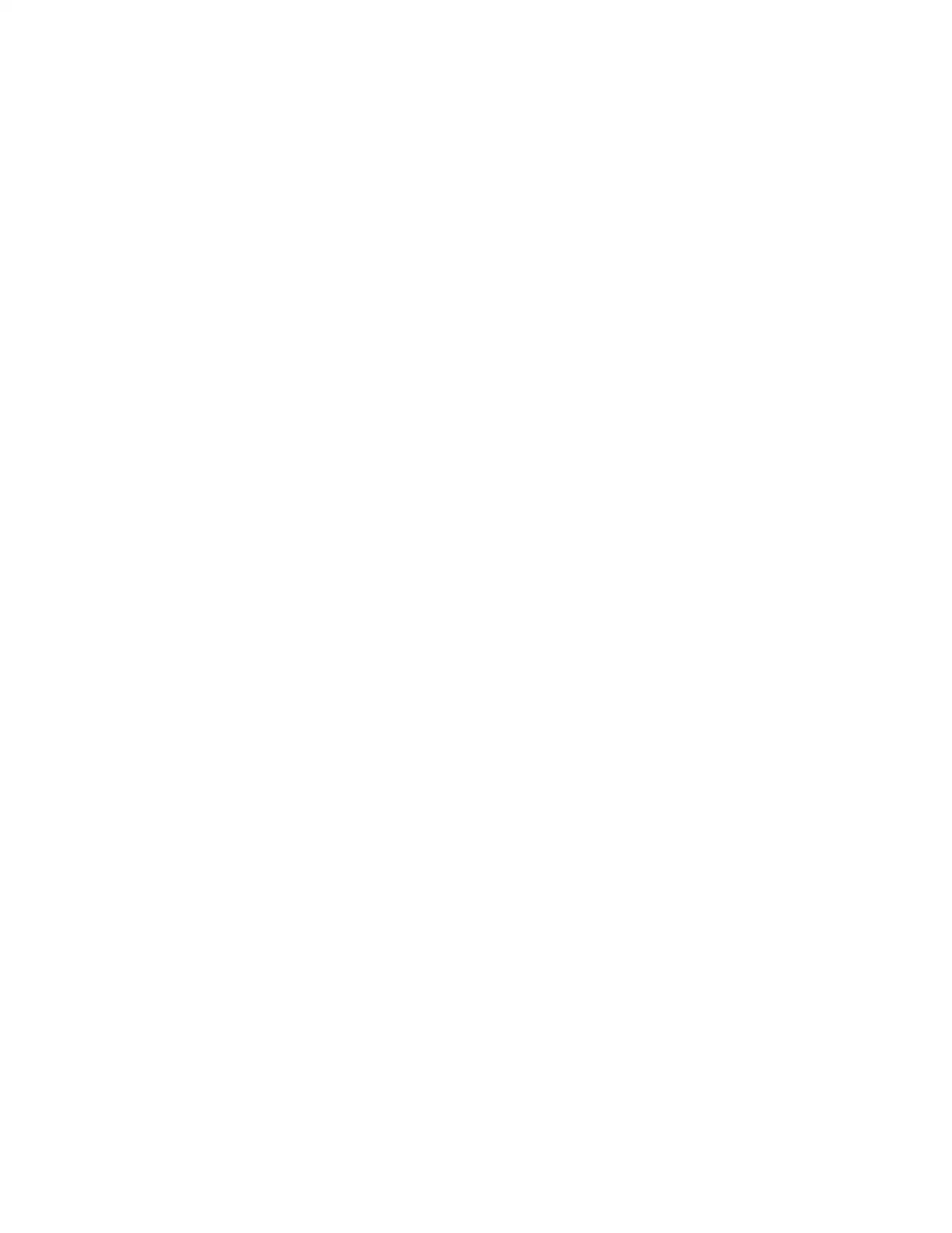
⊘ This is a preview!⊘
Do you want full access?
Subscribe today to unlock all pages.

Trusted by 1+ million students worldwide
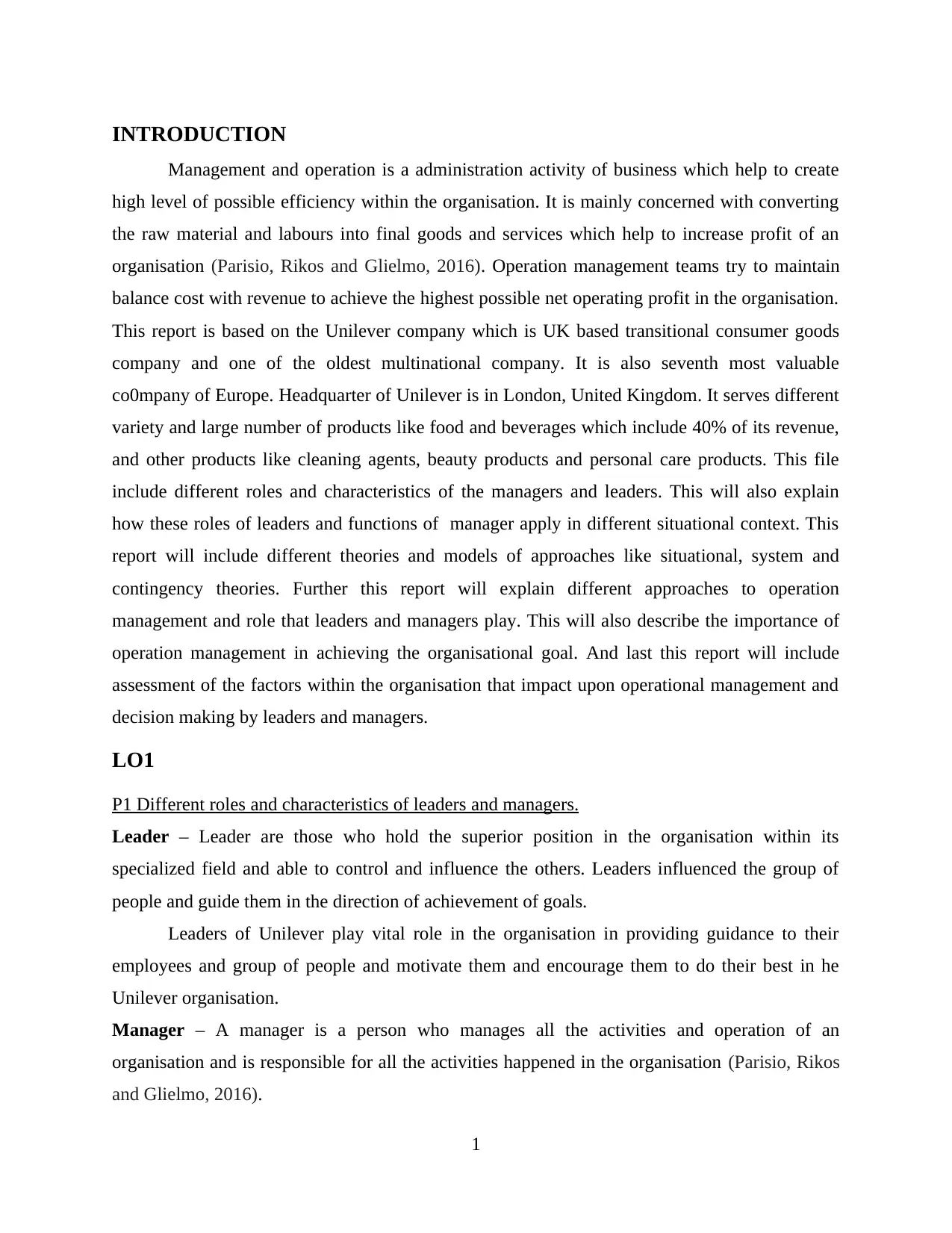
INTRODUCTION
Management and operation is a administration activity of business which help to create
high level of possible efficiency within the organisation. It is mainly concerned with converting
the raw material and labours into final goods and services which help to increase profit of an
organisation (Parisio, Rikos and Glielmo, 2016). Operation management teams try to maintain
balance cost with revenue to achieve the highest possible net operating profit in the organisation.
This report is based on the Unilever company which is UK based transitional consumer goods
company and one of the oldest multinational company. It is also seventh most valuable
co0mpany of Europe. Headquarter of Unilever is in London, United Kingdom. It serves different
variety and large number of products like food and beverages which include 40% of its revenue,
and other products like cleaning agents, beauty products and personal care products. This file
include different roles and characteristics of the managers and leaders. This will also explain
how these roles of leaders and functions of manager apply in different situational context. This
report will include different theories and models of approaches like situational, system and
contingency theories. Further this report will explain different approaches to operation
management and role that leaders and managers play. This will also describe the importance of
operation management in achieving the organisational goal. And last this report will include
assessment of the factors within the organisation that impact upon operational management and
decision making by leaders and managers.
LO1
P1 Different roles and characteristics of leaders and managers.
Leader – Leader are those who hold the superior position in the organisation within its
specialized field and able to control and influence the others. Leaders influenced the group of
people and guide them in the direction of achievement of goals.
Leaders of Unilever play vital role in the organisation in providing guidance to their
employees and group of people and motivate them and encourage them to do their best in he
Unilever organisation.
Manager – A manager is a person who manages all the activities and operation of an
organisation and is responsible for all the activities happened in the organisation (Parisio, Rikos
and Glielmo, 2016).
1
Management and operation is a administration activity of business which help to create
high level of possible efficiency within the organisation. It is mainly concerned with converting
the raw material and labours into final goods and services which help to increase profit of an
organisation (Parisio, Rikos and Glielmo, 2016). Operation management teams try to maintain
balance cost with revenue to achieve the highest possible net operating profit in the organisation.
This report is based on the Unilever company which is UK based transitional consumer goods
company and one of the oldest multinational company. It is also seventh most valuable
co0mpany of Europe. Headquarter of Unilever is in London, United Kingdom. It serves different
variety and large number of products like food and beverages which include 40% of its revenue,
and other products like cleaning agents, beauty products and personal care products. This file
include different roles and characteristics of the managers and leaders. This will also explain
how these roles of leaders and functions of manager apply in different situational context. This
report will include different theories and models of approaches like situational, system and
contingency theories. Further this report will explain different approaches to operation
management and role that leaders and managers play. This will also describe the importance of
operation management in achieving the organisational goal. And last this report will include
assessment of the factors within the organisation that impact upon operational management and
decision making by leaders and managers.
LO1
P1 Different roles and characteristics of leaders and managers.
Leader – Leader are those who hold the superior position in the organisation within its
specialized field and able to control and influence the others. Leaders influenced the group of
people and guide them in the direction of achievement of goals.
Leaders of Unilever play vital role in the organisation in providing guidance to their
employees and group of people and motivate them and encourage them to do their best in he
Unilever organisation.
Manager – A manager is a person who manages all the activities and operation of an
organisation and is responsible for all the activities happened in the organisation (Parisio, Rikos
and Glielmo, 2016).
1
Paraphrase This Document
Need a fresh take? Get an instant paraphrase of this document with our AI Paraphraser
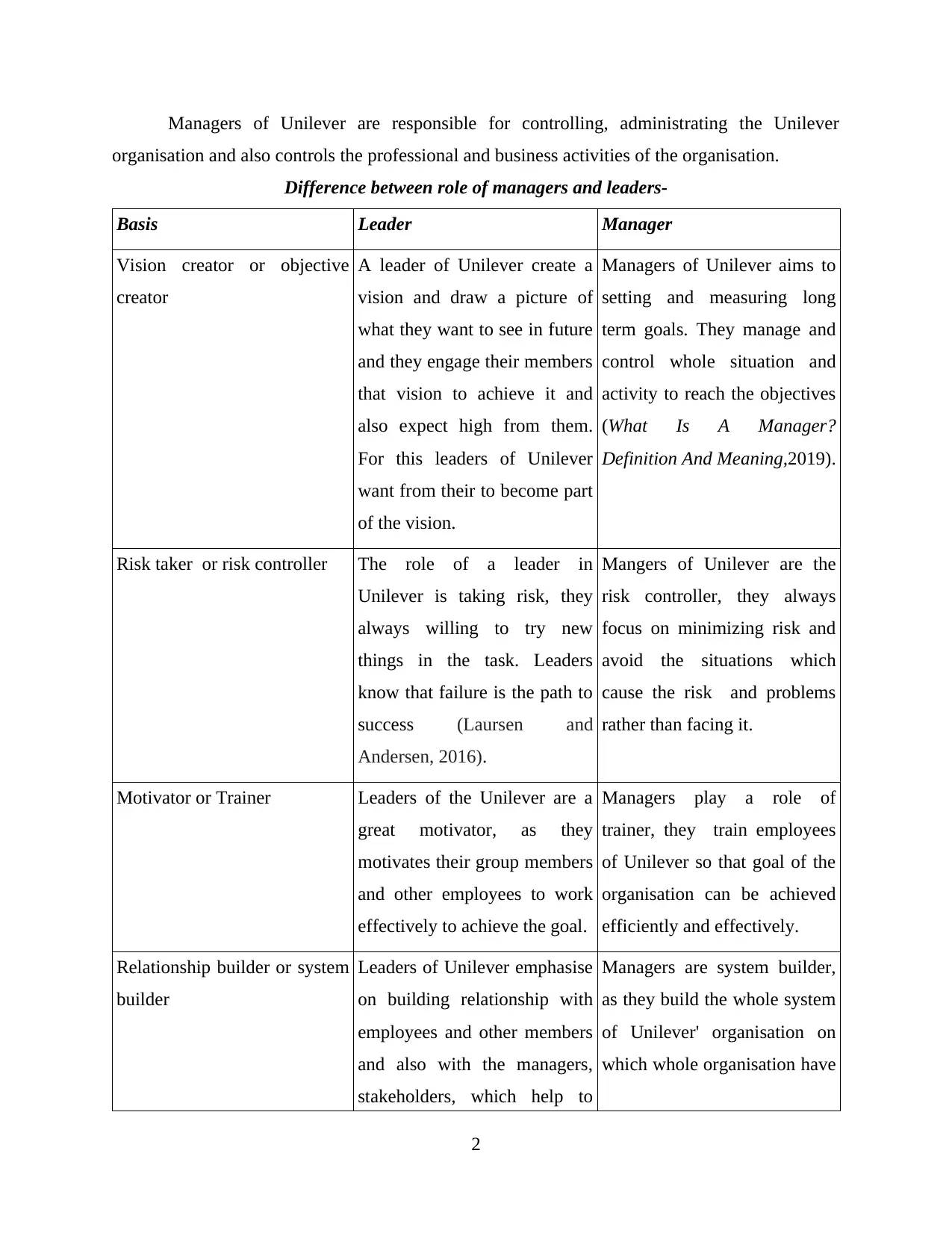
Managers of Unilever are responsible for controlling, administrating the Unilever
organisation and also controls the professional and business activities of the organisation.
Difference between role of managers and leaders-
Basis Leader Manager
Vision creator or objective
creator
A leader of Unilever create a
vision and draw a picture of
what they want to see in future
and they engage their members
that vision to achieve it and
also expect high from them.
For this leaders of Unilever
want from their to become part
of the vision.
Managers of Unilever aims to
setting and measuring long
term goals. They manage and
control whole situation and
activity to reach the objectives
(What Is A Manager?
Definition And Meaning,2019).
Risk taker or risk controller The role of a leader in
Unilever is taking risk, they
always willing to try new
things in the task. Leaders
know that failure is the path to
success (Laursen and
Andersen, 2016).
Mangers of Unilever are the
risk controller, they always
focus on minimizing risk and
avoid the situations which
cause the risk and problems
rather than facing it.
Motivator or Trainer Leaders of the Unilever are a
great motivator, as they
motivates their group members
and other employees to work
effectively to achieve the goal.
Managers play a role of
trainer, they train employees
of Unilever so that goal of the
organisation can be achieved
efficiently and effectively.
Relationship builder or system
builder
Leaders of Unilever emphasise
on building relationship with
employees and other members
and also with the managers,
stakeholders, which help to
Managers are system builder,
as they build the whole system
of Unilever' organisation on
which whole organisation have
2
organisation and also controls the professional and business activities of the organisation.
Difference between role of managers and leaders-
Basis Leader Manager
Vision creator or objective
creator
A leader of Unilever create a
vision and draw a picture of
what they want to see in future
and they engage their members
that vision to achieve it and
also expect high from them.
For this leaders of Unilever
want from their to become part
of the vision.
Managers of Unilever aims to
setting and measuring long
term goals. They manage and
control whole situation and
activity to reach the objectives
(What Is A Manager?
Definition And Meaning,2019).
Risk taker or risk controller The role of a leader in
Unilever is taking risk, they
always willing to try new
things in the task. Leaders
know that failure is the path to
success (Laursen and
Andersen, 2016).
Mangers of Unilever are the
risk controller, they always
focus on minimizing risk and
avoid the situations which
cause the risk and problems
rather than facing it.
Motivator or Trainer Leaders of the Unilever are a
great motivator, as they
motivates their group members
and other employees to work
effectively to achieve the goal.
Managers play a role of
trainer, they train employees
of Unilever so that goal of the
organisation can be achieved
efficiently and effectively.
Relationship builder or system
builder
Leaders of Unilever emphasise
on building relationship with
employees and other members
and also with the managers,
stakeholders, which help to
Managers are system builder,
as they build the whole system
of Unilever' organisation on
which whole organisation have
2
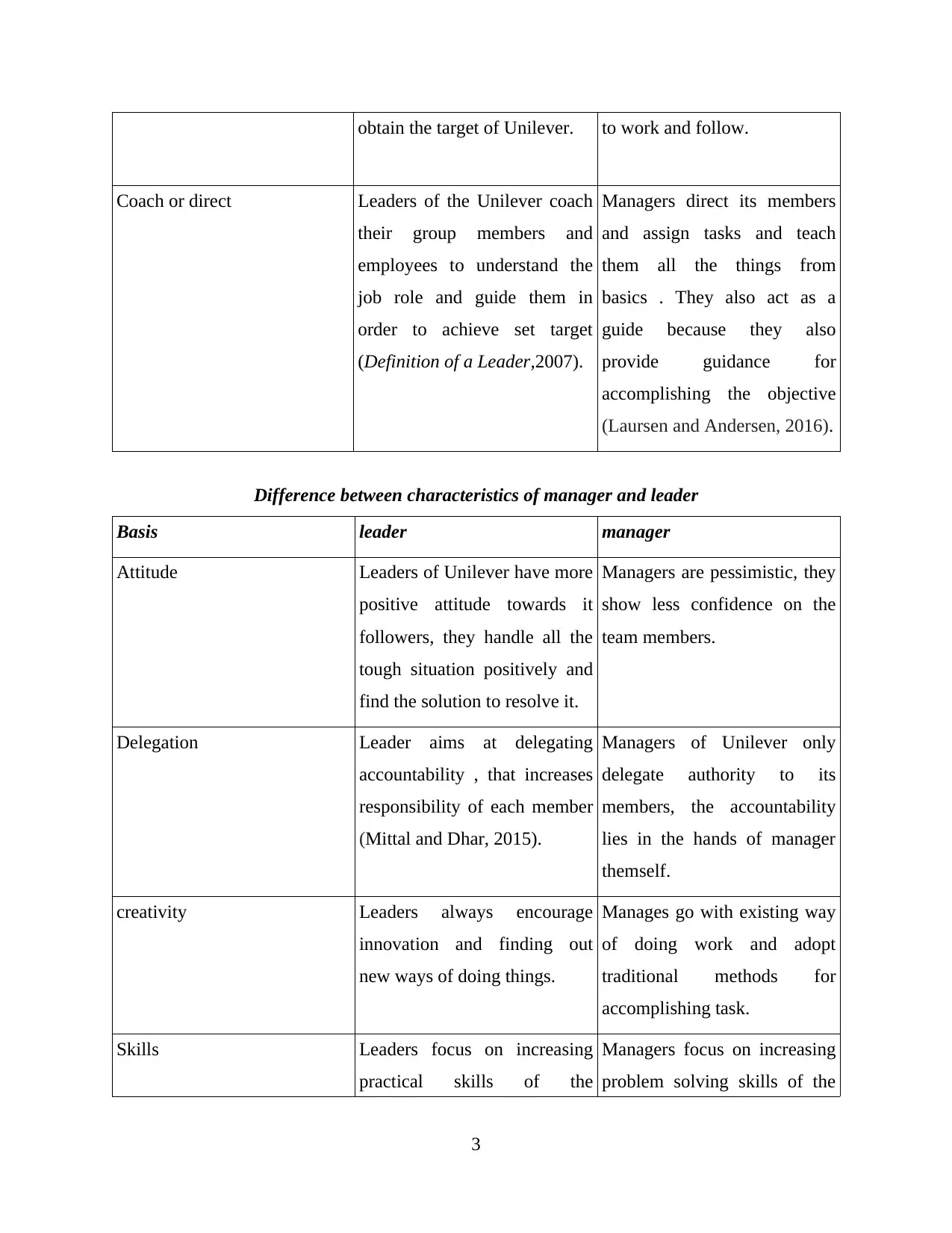
obtain the target of Unilever. to work and follow.
Coach or direct Leaders of the Unilever coach
their group members and
employees to understand the
job role and guide them in
order to achieve set target
(Definition of a Leader,2007).
Managers direct its members
and assign tasks and teach
them all the things from
basics . They also act as a
guide because they also
provide guidance for
accomplishing the objective
(Laursen and Andersen, 2016).
Difference between characteristics of manager and leader
Basis leader manager
Attitude Leaders of Unilever have more
positive attitude towards it
followers, they handle all the
tough situation positively and
find the solution to resolve it.
Managers are pessimistic, they
show less confidence on the
team members.
Delegation Leader aims at delegating
accountability , that increases
responsibility of each member
(Mittal and Dhar, 2015).
Managers of Unilever only
delegate authority to its
members, the accountability
lies in the hands of manager
themself.
creativity Leaders always encourage
innovation and finding out
new ways of doing things.
Manages go with existing way
of doing work and adopt
traditional methods for
accomplishing task.
Skills Leaders focus on increasing
practical skills of the
Managers focus on increasing
problem solving skills of the
3
Coach or direct Leaders of the Unilever coach
their group members and
employees to understand the
job role and guide them in
order to achieve set target
(Definition of a Leader,2007).
Managers direct its members
and assign tasks and teach
them all the things from
basics . They also act as a
guide because they also
provide guidance for
accomplishing the objective
(Laursen and Andersen, 2016).
Difference between characteristics of manager and leader
Basis leader manager
Attitude Leaders of Unilever have more
positive attitude towards it
followers, they handle all the
tough situation positively and
find the solution to resolve it.
Managers are pessimistic, they
show less confidence on the
team members.
Delegation Leader aims at delegating
accountability , that increases
responsibility of each member
(Mittal and Dhar, 2015).
Managers of Unilever only
delegate authority to its
members, the accountability
lies in the hands of manager
themself.
creativity Leaders always encourage
innovation and finding out
new ways of doing things.
Manages go with existing way
of doing work and adopt
traditional methods for
accomplishing task.
Skills Leaders focus on increasing
practical skills of the
Managers focus on increasing
problem solving skills of the
3
⊘ This is a preview!⊘
Do you want full access?
Subscribe today to unlock all pages.

Trusted by 1+ million students worldwide
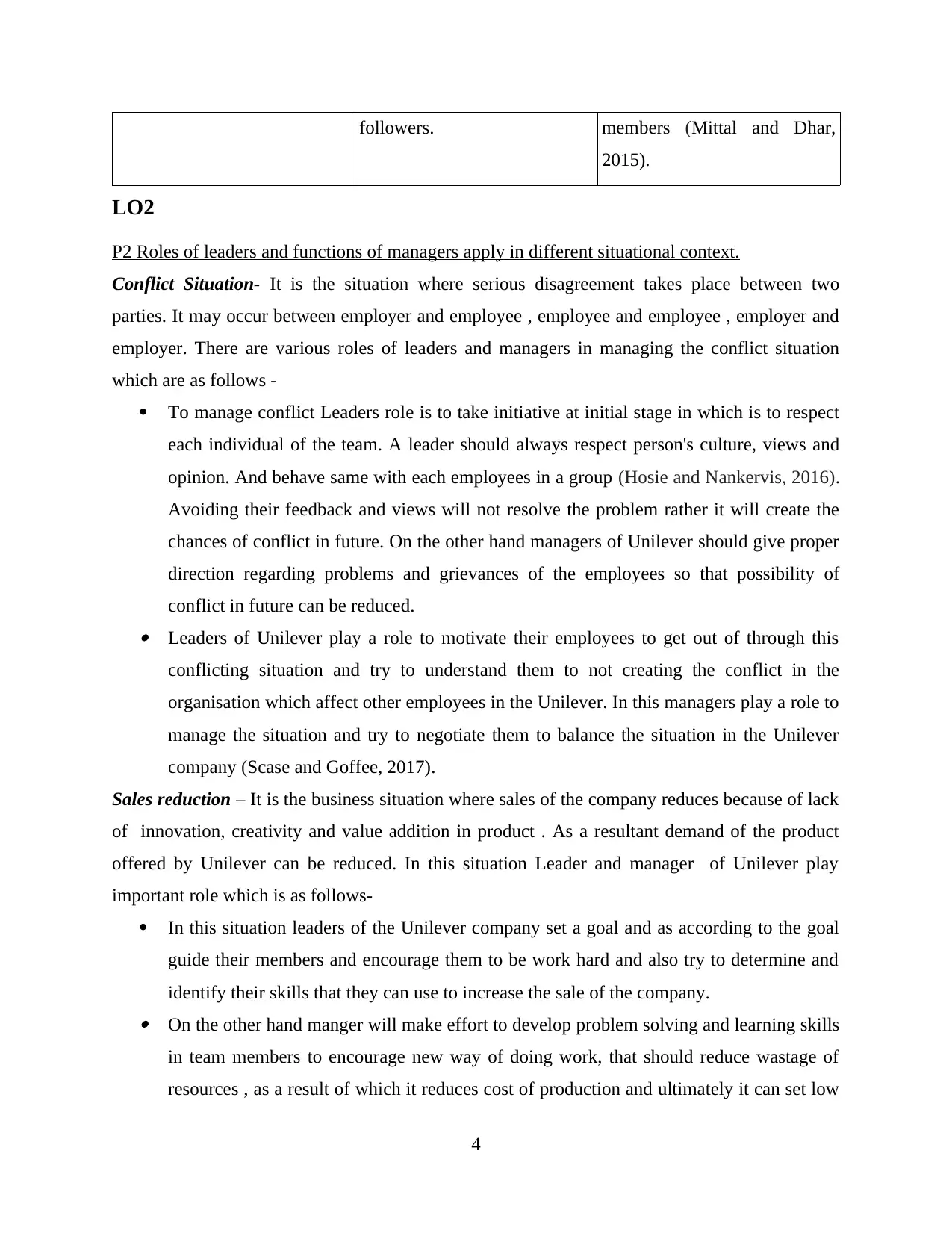
followers. members (Mittal and Dhar,
2015).
LO2
P2 Roles of leaders and functions of managers apply in different situational context.
Conflict Situation- It is the situation where serious disagreement takes place between two
parties. It may occur between employer and employee , employee and employee , employer and
employer. There are various roles of leaders and managers in managing the conflict situation
which are as follows -
To manage conflict Leaders role is to take initiative at initial stage in which is to respect
each individual of the team. A leader should always respect person's culture, views and
opinion. And behave same with each employees in a group (Hosie and Nankervis, 2016).
Avoiding their feedback and views will not resolve the problem rather it will create the
chances of conflict in future. On the other hand managers of Unilever should give proper
direction regarding problems and grievances of the employees so that possibility of
conflict in future can be reduced. Leaders of Unilever play a role to motivate their employees to get out of through this
conflicting situation and try to understand them to not creating the conflict in the
organisation which affect other employees in the Unilever. In this managers play a role to
manage the situation and try to negotiate them to balance the situation in the Unilever
company (Scase and Goffee, 2017).
Sales reduction – It is the business situation where sales of the company reduces because of lack
of innovation, creativity and value addition in product . As a resultant demand of the product
offered by Unilever can be reduced. In this situation Leader and manager of Unilever play
important role which is as follows-
In this situation leaders of the Unilever company set a goal and as according to the goal
guide their members and encourage them to be work hard and also try to determine and
identify their skills that they can use to increase the sale of the company. On the other hand manger will make effort to develop problem solving and learning skills
in team members to encourage new way of doing work, that should reduce wastage of
resources , as a result of which it reduces cost of production and ultimately it can set low
4
2015).
LO2
P2 Roles of leaders and functions of managers apply in different situational context.
Conflict Situation- It is the situation where serious disagreement takes place between two
parties. It may occur between employer and employee , employee and employee , employer and
employer. There are various roles of leaders and managers in managing the conflict situation
which are as follows -
To manage conflict Leaders role is to take initiative at initial stage in which is to respect
each individual of the team. A leader should always respect person's culture, views and
opinion. And behave same with each employees in a group (Hosie and Nankervis, 2016).
Avoiding their feedback and views will not resolve the problem rather it will create the
chances of conflict in future. On the other hand managers of Unilever should give proper
direction regarding problems and grievances of the employees so that possibility of
conflict in future can be reduced. Leaders of Unilever play a role to motivate their employees to get out of through this
conflicting situation and try to understand them to not creating the conflict in the
organisation which affect other employees in the Unilever. In this managers play a role to
manage the situation and try to negotiate them to balance the situation in the Unilever
company (Scase and Goffee, 2017).
Sales reduction – It is the business situation where sales of the company reduces because of lack
of innovation, creativity and value addition in product . As a resultant demand of the product
offered by Unilever can be reduced. In this situation Leader and manager of Unilever play
important role which is as follows-
In this situation leaders of the Unilever company set a goal and as according to the goal
guide their members and encourage them to be work hard and also try to determine and
identify their skills that they can use to increase the sale of the company. On the other hand manger will make effort to develop problem solving and learning skills
in team members to encourage new way of doing work, that should reduce wastage of
resources , as a result of which it reduces cost of production and ultimately it can set low
4
Paraphrase This Document
Need a fresh take? Get an instant paraphrase of this document with our AI Paraphraser
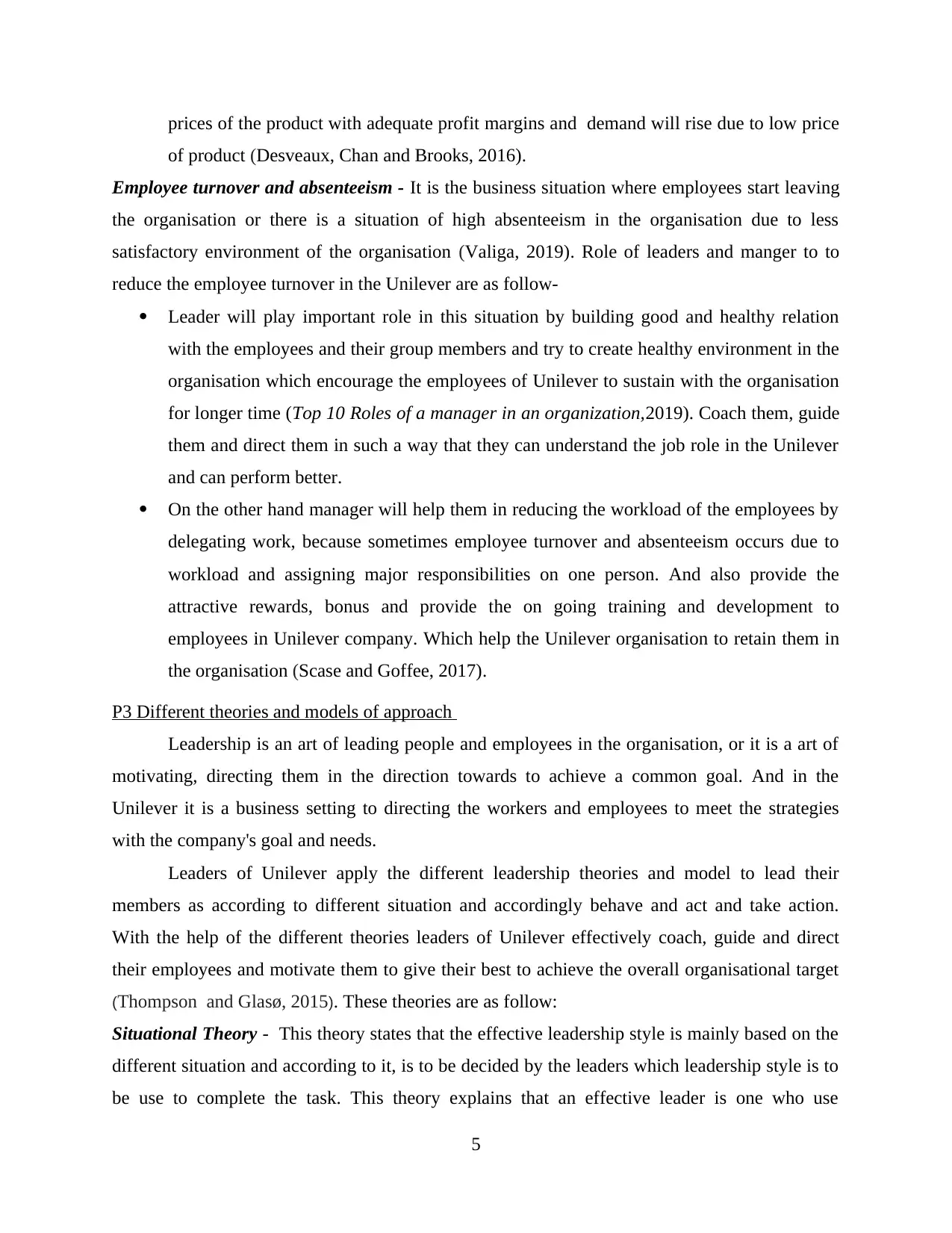
prices of the product with adequate profit margins and demand will rise due to low price
of product (Desveaux, Chan and Brooks, 2016).
Employee turnover and absenteeism - It is the business situation where employees start leaving
the organisation or there is a situation of high absenteeism in the organisation due to less
satisfactory environment of the organisation (Valiga, 2019). Role of leaders and manger to to
reduce the employee turnover in the Unilever are as follow-
Leader will play important role in this situation by building good and healthy relation
with the employees and their group members and try to create healthy environment in the
organisation which encourage the employees of Unilever to sustain with the organisation
for longer time (Top 10 Roles of a manager in an organization,2019). Coach them, guide
them and direct them in such a way that they can understand the job role in the Unilever
and can perform better.
On the other hand manager will help them in reducing the workload of the employees by
delegating work, because sometimes employee turnover and absenteeism occurs due to
workload and assigning major responsibilities on one person. And also provide the
attractive rewards, bonus and provide the on going training and development to
employees in Unilever company. Which help the Unilever organisation to retain them in
the organisation (Scase and Goffee, 2017).
P3 Different theories and models of approach
Leadership is an art of leading people and employees in the organisation, or it is a art of
motivating, directing them in the direction towards to achieve a common goal. And in the
Unilever it is a business setting to directing the workers and employees to meet the strategies
with the company's goal and needs.
Leaders of Unilever apply the different leadership theories and model to lead their
members as according to different situation and accordingly behave and act and take action.
With the help of the different theories leaders of Unilever effectively coach, guide and direct
their employees and motivate them to give their best to achieve the overall organisational target
(Thompson and Glasø, 2015). These theories are as follow:
Situational Theory - This theory states that the effective leadership style is mainly based on the
different situation and according to it, is to be decided by the leaders which leadership style is to
be use to complete the task. This theory explains that an effective leader is one who use
5
of product (Desveaux, Chan and Brooks, 2016).
Employee turnover and absenteeism - It is the business situation where employees start leaving
the organisation or there is a situation of high absenteeism in the organisation due to less
satisfactory environment of the organisation (Valiga, 2019). Role of leaders and manger to to
reduce the employee turnover in the Unilever are as follow-
Leader will play important role in this situation by building good and healthy relation
with the employees and their group members and try to create healthy environment in the
organisation which encourage the employees of Unilever to sustain with the organisation
for longer time (Top 10 Roles of a manager in an organization,2019). Coach them, guide
them and direct them in such a way that they can understand the job role in the Unilever
and can perform better.
On the other hand manager will help them in reducing the workload of the employees by
delegating work, because sometimes employee turnover and absenteeism occurs due to
workload and assigning major responsibilities on one person. And also provide the
attractive rewards, bonus and provide the on going training and development to
employees in Unilever company. Which help the Unilever organisation to retain them in
the organisation (Scase and Goffee, 2017).
P3 Different theories and models of approach
Leadership is an art of leading people and employees in the organisation, or it is a art of
motivating, directing them in the direction towards to achieve a common goal. And in the
Unilever it is a business setting to directing the workers and employees to meet the strategies
with the company's goal and needs.
Leaders of Unilever apply the different leadership theories and model to lead their
members as according to different situation and accordingly behave and act and take action.
With the help of the different theories leaders of Unilever effectively coach, guide and direct
their employees and motivate them to give their best to achieve the overall organisational target
(Thompson and Glasø, 2015). These theories are as follow:
Situational Theory - This theory states that the effective leadership style is mainly based on the
different situation and according to it, is to be decided by the leaders which leadership style is to
be use to complete the task. This theory explains that an effective leader is one who use
5
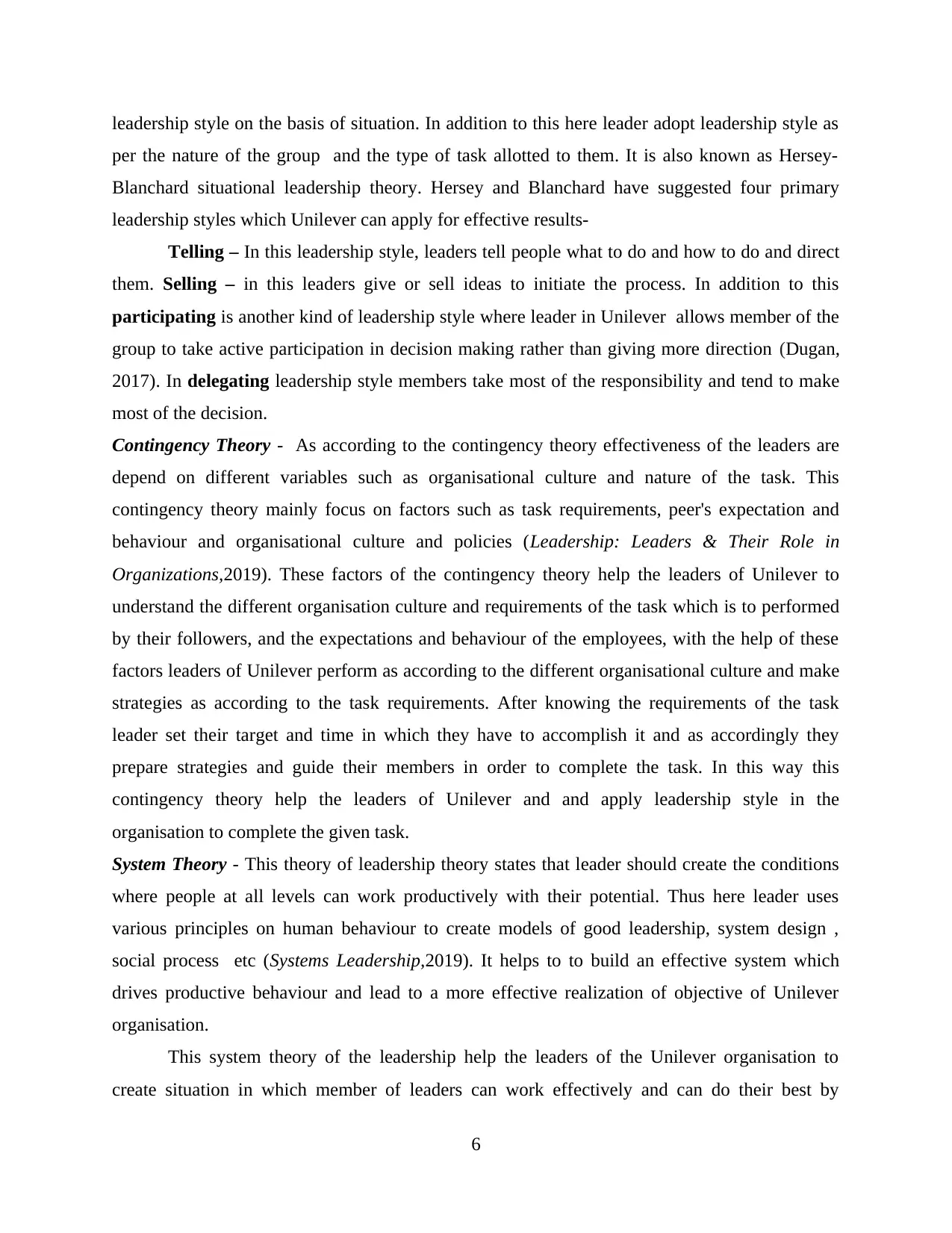
leadership style on the basis of situation. In addition to this here leader adopt leadership style as
per the nature of the group and the type of task allotted to them. It is also known as Hersey-
Blanchard situational leadership theory. Hersey and Blanchard have suggested four primary
leadership styles which Unilever can apply for effective results-
Telling – In this leadership style, leaders tell people what to do and how to do and direct
them. Selling – in this leaders give or sell ideas to initiate the process. In addition to this
participating is another kind of leadership style where leader in Unilever allows member of the
group to take active participation in decision making rather than giving more direction (Dugan,
2017). In delegating leadership style members take most of the responsibility and tend to make
most of the decision.
Contingency Theory - As according to the contingency theory effectiveness of the leaders are
depend on different variables such as organisational culture and nature of the task. This
contingency theory mainly focus on factors such as task requirements, peer's expectation and
behaviour and organisational culture and policies (Leadership: Leaders & Their Role in
Organizations,2019). These factors of the contingency theory help the leaders of Unilever to
understand the different organisation culture and requirements of the task which is to performed
by their followers, and the expectations and behaviour of the employees, with the help of these
factors leaders of Unilever perform as according to the different organisational culture and make
strategies as according to the task requirements. After knowing the requirements of the task
leader set their target and time in which they have to accomplish it and as accordingly they
prepare strategies and guide their members in order to complete the task. In this way this
contingency theory help the leaders of Unilever and and apply leadership style in the
organisation to complete the given task.
System Theory - This theory of leadership theory states that leader should create the conditions
where people at all levels can work productively with their potential. Thus here leader uses
various principles on human behaviour to create models of good leadership, system design ,
social process etc (Systems Leadership,2019). It helps to to build an effective system which
drives productive behaviour and lead to a more effective realization of objective of Unilever
organisation.
This system theory of the leadership help the leaders of the Unilever organisation to
create situation in which member of leaders can work effectively and can do their best by
6
per the nature of the group and the type of task allotted to them. It is also known as Hersey-
Blanchard situational leadership theory. Hersey and Blanchard have suggested four primary
leadership styles which Unilever can apply for effective results-
Telling – In this leadership style, leaders tell people what to do and how to do and direct
them. Selling – in this leaders give or sell ideas to initiate the process. In addition to this
participating is another kind of leadership style where leader in Unilever allows member of the
group to take active participation in decision making rather than giving more direction (Dugan,
2017). In delegating leadership style members take most of the responsibility and tend to make
most of the decision.
Contingency Theory - As according to the contingency theory effectiveness of the leaders are
depend on different variables such as organisational culture and nature of the task. This
contingency theory mainly focus on factors such as task requirements, peer's expectation and
behaviour and organisational culture and policies (Leadership: Leaders & Their Role in
Organizations,2019). These factors of the contingency theory help the leaders of Unilever to
understand the different organisation culture and requirements of the task which is to performed
by their followers, and the expectations and behaviour of the employees, with the help of these
factors leaders of Unilever perform as according to the different organisational culture and make
strategies as according to the task requirements. After knowing the requirements of the task
leader set their target and time in which they have to accomplish it and as accordingly they
prepare strategies and guide their members in order to complete the task. In this way this
contingency theory help the leaders of Unilever and and apply leadership style in the
organisation to complete the given task.
System Theory - This theory of leadership theory states that leader should create the conditions
where people at all levels can work productively with their potential. Thus here leader uses
various principles on human behaviour to create models of good leadership, system design ,
social process etc (Systems Leadership,2019). It helps to to build an effective system which
drives productive behaviour and lead to a more effective realization of objective of Unilever
organisation.
This system theory of the leadership help the leaders of the Unilever organisation to
create situation in which member of leaders can work effectively and can do their best by
6
⊘ This is a preview!⊘
Do you want full access?
Subscribe today to unlock all pages.

Trusted by 1+ million students worldwide
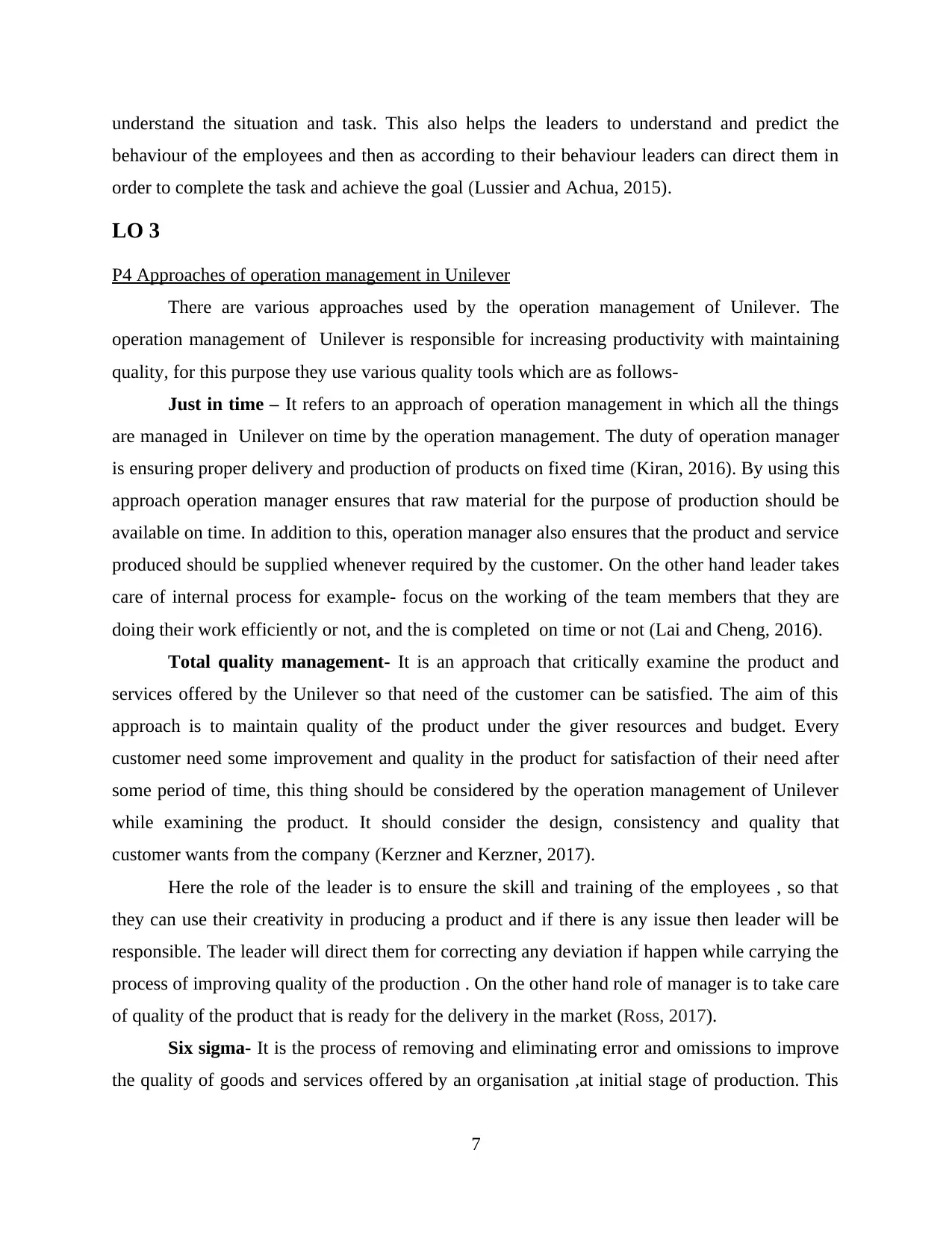
understand the situation and task. This also helps the leaders to understand and predict the
behaviour of the employees and then as according to their behaviour leaders can direct them in
order to complete the task and achieve the goal (Lussier and Achua, 2015).
LO 3
P4 Approaches of operation management in Unilever
There are various approaches used by the operation management of Unilever. The
operation management of Unilever is responsible for increasing productivity with maintaining
quality, for this purpose they use various quality tools which are as follows-
Just in time – It refers to an approach of operation management in which all the things
are managed in Unilever on time by the operation management. The duty of operation manager
is ensuring proper delivery and production of products on fixed time (Kiran, 2016). By using this
approach operation manager ensures that raw material for the purpose of production should be
available on time. In addition to this, operation manager also ensures that the product and service
produced should be supplied whenever required by the customer. On the other hand leader takes
care of internal process for example- focus on the working of the team members that they are
doing their work efficiently or not, and the is completed on time or not (Lai and Cheng, 2016).
Total quality management- It is an approach that critically examine the product and
services offered by the Unilever so that need of the customer can be satisfied. The aim of this
approach is to maintain quality of the product under the giver resources and budget. Every
customer need some improvement and quality in the product for satisfaction of their need after
some period of time, this thing should be considered by the operation management of Unilever
while examining the product. It should consider the design, consistency and quality that
customer wants from the company (Kerzner and Kerzner, 2017).
Here the role of the leader is to ensure the skill and training of the employees , so that
they can use their creativity in producing a product and if there is any issue then leader will be
responsible. The leader will direct them for correcting any deviation if happen while carrying the
process of improving quality of the production . On the other hand role of manager is to take care
of quality of the product that is ready for the delivery in the market (Ross, 2017).
Six sigma- It is the process of removing and eliminating error and omissions to improve
the quality of goods and services offered by an organisation ,at initial stage of production. This
7
behaviour of the employees and then as according to their behaviour leaders can direct them in
order to complete the task and achieve the goal (Lussier and Achua, 2015).
LO 3
P4 Approaches of operation management in Unilever
There are various approaches used by the operation management of Unilever. The
operation management of Unilever is responsible for increasing productivity with maintaining
quality, for this purpose they use various quality tools which are as follows-
Just in time – It refers to an approach of operation management in which all the things
are managed in Unilever on time by the operation management. The duty of operation manager
is ensuring proper delivery and production of products on fixed time (Kiran, 2016). By using this
approach operation manager ensures that raw material for the purpose of production should be
available on time. In addition to this, operation manager also ensures that the product and service
produced should be supplied whenever required by the customer. On the other hand leader takes
care of internal process for example- focus on the working of the team members that they are
doing their work efficiently or not, and the is completed on time or not (Lai and Cheng, 2016).
Total quality management- It is an approach that critically examine the product and
services offered by the Unilever so that need of the customer can be satisfied. The aim of this
approach is to maintain quality of the product under the giver resources and budget. Every
customer need some improvement and quality in the product for satisfaction of their need after
some period of time, this thing should be considered by the operation management of Unilever
while examining the product. It should consider the design, consistency and quality that
customer wants from the company (Kerzner and Kerzner, 2017).
Here the role of the leader is to ensure the skill and training of the employees , so that
they can use their creativity in producing a product and if there is any issue then leader will be
responsible. The leader will direct them for correcting any deviation if happen while carrying the
process of improving quality of the production . On the other hand role of manager is to take care
of quality of the product that is ready for the delivery in the market (Ross, 2017).
Six sigma- It is the process of removing and eliminating error and omissions to improve
the quality of goods and services offered by an organisation ,at initial stage of production. This
7
Paraphrase This Document
Need a fresh take? Get an instant paraphrase of this document with our AI Paraphraser
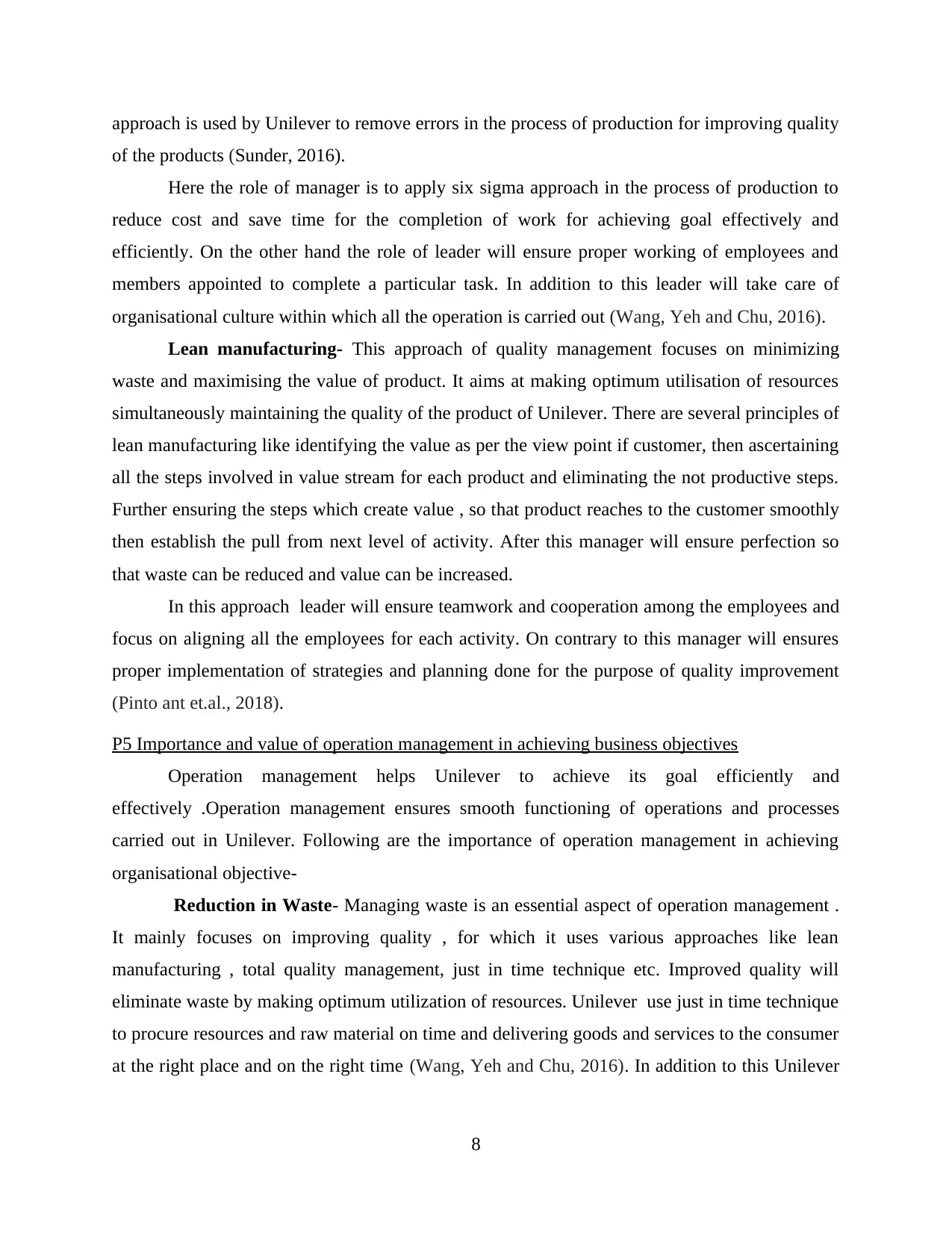
approach is used by Unilever to remove errors in the process of production for improving quality
of the products (Sunder, 2016).
Here the role of manager is to apply six sigma approach in the process of production to
reduce cost and save time for the completion of work for achieving goal effectively and
efficiently. On the other hand the role of leader will ensure proper working of employees and
members appointed to complete a particular task. In addition to this leader will take care of
organisational culture within which all the operation is carried out (Wang, Yeh and Chu, 2016).
Lean manufacturing- This approach of quality management focuses on minimizing
waste and maximising the value of product. It aims at making optimum utilisation of resources
simultaneously maintaining the quality of the product of Unilever. There are several principles of
lean manufacturing like identifying the value as per the view point if customer, then ascertaining
all the steps involved in value stream for each product and eliminating the not productive steps.
Further ensuring the steps which create value , so that product reaches to the customer smoothly
then establish the pull from next level of activity. After this manager will ensure perfection so
that waste can be reduced and value can be increased.
In this approach leader will ensure teamwork and cooperation among the employees and
focus on aligning all the employees for each activity. On contrary to this manager will ensures
proper implementation of strategies and planning done for the purpose of quality improvement
(Pinto ant et.al., 2018).
P5 Importance and value of operation management in achieving business objectives
Operation management helps Unilever to achieve its goal efficiently and
effectively .Operation management ensures smooth functioning of operations and processes
carried out in Unilever. Following are the importance of operation management in achieving
organisational objective-
Reduction in Waste- Managing waste is an essential aspect of operation management .
It mainly focuses on improving quality , for which it uses various approaches like lean
manufacturing , total quality management, just in time technique etc. Improved quality will
eliminate waste by making optimum utilization of resources. Unilever use just in time technique
to procure resources and raw material on time and delivering goods and services to the consumer
at the right place and on the right time (Wang, Yeh and Chu, 2016). In addition to this Unilever
8
of the products (Sunder, 2016).
Here the role of manager is to apply six sigma approach in the process of production to
reduce cost and save time for the completion of work for achieving goal effectively and
efficiently. On the other hand the role of leader will ensure proper working of employees and
members appointed to complete a particular task. In addition to this leader will take care of
organisational culture within which all the operation is carried out (Wang, Yeh and Chu, 2016).
Lean manufacturing- This approach of quality management focuses on minimizing
waste and maximising the value of product. It aims at making optimum utilisation of resources
simultaneously maintaining the quality of the product of Unilever. There are several principles of
lean manufacturing like identifying the value as per the view point if customer, then ascertaining
all the steps involved in value stream for each product and eliminating the not productive steps.
Further ensuring the steps which create value , so that product reaches to the customer smoothly
then establish the pull from next level of activity. After this manager will ensure perfection so
that waste can be reduced and value can be increased.
In this approach leader will ensure teamwork and cooperation among the employees and
focus on aligning all the employees for each activity. On contrary to this manager will ensures
proper implementation of strategies and planning done for the purpose of quality improvement
(Pinto ant et.al., 2018).
P5 Importance and value of operation management in achieving business objectives
Operation management helps Unilever to achieve its goal efficiently and
effectively .Operation management ensures smooth functioning of operations and processes
carried out in Unilever. Following are the importance of operation management in achieving
organisational objective-
Reduction in Waste- Managing waste is an essential aspect of operation management .
It mainly focuses on improving quality , for which it uses various approaches like lean
manufacturing , total quality management, just in time technique etc. Improved quality will
eliminate waste by making optimum utilization of resources. Unilever use just in time technique
to procure resources and raw material on time and delivering goods and services to the consumer
at the right place and on the right time (Wang, Yeh and Chu, 2016). In addition to this Unilever
8
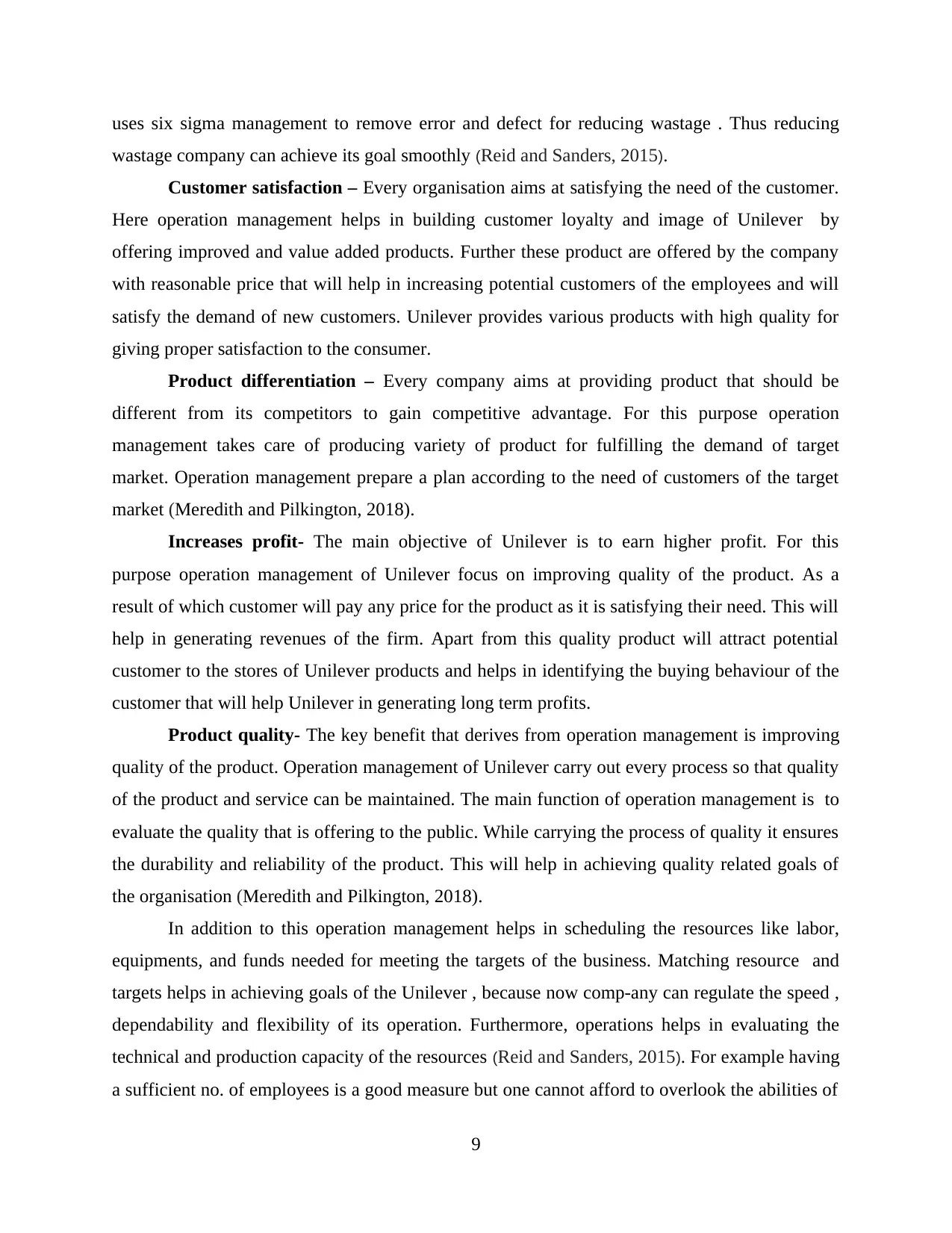
uses six sigma management to remove error and defect for reducing wastage . Thus reducing
wastage company can achieve its goal smoothly (Reid and Sanders, 2015).
Customer satisfaction – Every organisation aims at satisfying the need of the customer.
Here operation management helps in building customer loyalty and image of Unilever by
offering improved and value added products. Further these product are offered by the company
with reasonable price that will help in increasing potential customers of the employees and will
satisfy the demand of new customers. Unilever provides various products with high quality for
giving proper satisfaction to the consumer.
Product differentiation – Every company aims at providing product that should be
different from its competitors to gain competitive advantage. For this purpose operation
management takes care of producing variety of product for fulfilling the demand of target
market. Operation management prepare a plan according to the need of customers of the target
market (Meredith and Pilkington, 2018).
Increases profit- The main objective of Unilever is to earn higher profit. For this
purpose operation management of Unilever focus on improving quality of the product. As a
result of which customer will pay any price for the product as it is satisfying their need. This will
help in generating revenues of the firm. Apart from this quality product will attract potential
customer to the stores of Unilever products and helps in identifying the buying behaviour of the
customer that will help Unilever in generating long term profits.
Product quality- The key benefit that derives from operation management is improving
quality of the product. Operation management of Unilever carry out every process so that quality
of the product and service can be maintained. The main function of operation management is to
evaluate the quality that is offering to the public. While carrying the process of quality it ensures
the durability and reliability of the product. This will help in achieving quality related goals of
the organisation (Meredith and Pilkington, 2018).
In addition to this operation management helps in scheduling the resources like labor,
equipments, and funds needed for meeting the targets of the business. Matching resource and
targets helps in achieving goals of the Unilever , because now comp-any can regulate the speed ,
dependability and flexibility of its operation. Furthermore, operations helps in evaluating the
technical and production capacity of the resources (Reid and Sanders, 2015). For example having
a sufficient no. of employees is a good measure but one cannot afford to overlook the abilities of
9
wastage company can achieve its goal smoothly (Reid and Sanders, 2015).
Customer satisfaction – Every organisation aims at satisfying the need of the customer.
Here operation management helps in building customer loyalty and image of Unilever by
offering improved and value added products. Further these product are offered by the company
with reasonable price that will help in increasing potential customers of the employees and will
satisfy the demand of new customers. Unilever provides various products with high quality for
giving proper satisfaction to the consumer.
Product differentiation – Every company aims at providing product that should be
different from its competitors to gain competitive advantage. For this purpose operation
management takes care of producing variety of product for fulfilling the demand of target
market. Operation management prepare a plan according to the need of customers of the target
market (Meredith and Pilkington, 2018).
Increases profit- The main objective of Unilever is to earn higher profit. For this
purpose operation management of Unilever focus on improving quality of the product. As a
result of which customer will pay any price for the product as it is satisfying their need. This will
help in generating revenues of the firm. Apart from this quality product will attract potential
customer to the stores of Unilever products and helps in identifying the buying behaviour of the
customer that will help Unilever in generating long term profits.
Product quality- The key benefit that derives from operation management is improving
quality of the product. Operation management of Unilever carry out every process so that quality
of the product and service can be maintained. The main function of operation management is to
evaluate the quality that is offering to the public. While carrying the process of quality it ensures
the durability and reliability of the product. This will help in achieving quality related goals of
the organisation (Meredith and Pilkington, 2018).
In addition to this operation management helps in scheduling the resources like labor,
equipments, and funds needed for meeting the targets of the business. Matching resource and
targets helps in achieving goals of the Unilever , because now comp-any can regulate the speed ,
dependability and flexibility of its operation. Furthermore, operations helps in evaluating the
technical and production capacity of the resources (Reid and Sanders, 2015). For example having
a sufficient no. of employees is a good measure but one cannot afford to overlook the abilities of
9
⊘ This is a preview!⊘
Do you want full access?
Subscribe today to unlock all pages.

Trusted by 1+ million students worldwide
1 out of 17
Related Documents
Your All-in-One AI-Powered Toolkit for Academic Success.
+13062052269
info@desklib.com
Available 24*7 on WhatsApp / Email
![[object Object]](/_next/static/media/star-bottom.7253800d.svg)
Unlock your academic potential
Copyright © 2020–2026 A2Z Services. All Rights Reserved. Developed and managed by ZUCOL.





